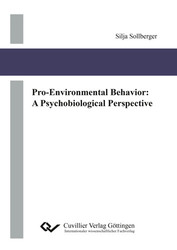| Departments | |
|---|---|
| Book Series (96) |
1381
|
| Nachhaltigkeit |
3
|
| Gesundheitswesen |
1
|
| Humanities |
2370
|
| Medienwissenschaften | 16 |
| Theology | 57 |
| Philosophy | 102 |
| Law | 424 |
| Economics | 851 |
| Social sciences | 418 |
| Sports science | 48 |
| Psychology | 233 |
| Educational science | 190 |
| History | 183 |
| Art | 111 |
| Cultural studies | 166 |
| Literary studies | 117 |
| Linguistics | 88 |
| Natural Sciences |
5408
|
| Engineering |
1795
|
| Common |
98
|
|
Leitlinien Unfallchirurgie
5. Auflage bestellen |
|
Advanced Search
Pro-Environmental Behavior: A Psychobiological Perspective (English shop)
Silja Sollberger (Author)Preview
Table of Contents, PDF (48 KB)
Extract, PDF (77 KB)
This thesis aimed to contribute to a better understanding of the determinants of pro-environmental behavior by exploring the yet unexamined predictive value of psychobiological factors. Two empirical studies were conducted to investigate how pro-environmental behavior relates to baseline hormone concentrations as well as acute psychosocial stress in men. In the first study, we found that testosterone was negatively associated with self-reported energy-saving behavior exclusivelywhen cortisol levels were low. These results provide first evidence for an endocrine correlate of pro-environmental behavior and at the same time reinforce the importance of considering reciprocal hormone systems simultaneously. In the second study, we found that acute stress significantly increased the propensity to donate for the environment, but only in men with low pro-environmental orientation. Moreover, their decision to donate was positively related to the cortisol stress response as well as the emotion regulation strategy mood repair, and associated with an increase in calmness. In contrast, stress generally diminished the donated amount of money, irrespectively of participants’ pro-environmental orientation. In conclusion, the present thesis provides novel evidence for the role of psychobiological factors in the prediction of pro-environmental behavior.
| ISBN-13 (Hard Copy) | 9783736991781 |
| ISBN-13 (eBook) | 9783736981782 |
| Final Book Format | A5 |
| Language | English |
| Lamination of Cover | glossy |
| Edition | 1. Aufl. |
| Publication Place | Göttingen |
| Place of Dissertation | Zürich |
| Publication Date | 2016-01-14 |
| General Categorization | Dissertation |
| Departments |
Psychology
|
| Keywords | pro-environmental behavior, testosterone,cortisol, stress, prosocial behavior, donation |








